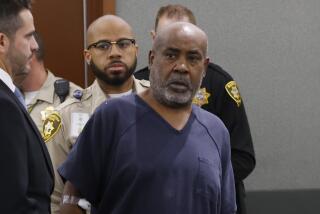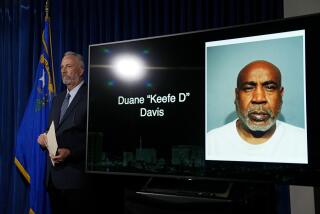A Decade After Slaying, a Casual Fugitive Is Collared
- Share via
Even in these times when computers track our movements and swap our secrets, when people look twice at strangers and watch Most Wanted television shows, it is still possible to get lost in America.
Take the case of Terry Matthew Theus.
In 1985 Theus fled Compton the day after a slaying that police believe he committed.
He went to Miami and even visited Cuba. Theus returned to California, however, and since the late 1980s his life has been marked by social rather than geographical mobility. He settled near Lake Tahoe. He found work, got married, bought property, made some investments, registered to vote, took up skiing.
And Theus, now 35, had a few dealings with the bureaucracy. Some must have been disconcerting--he was cited for several moving violations and, in 1991, was arrested after a domestic dispute. But others were gratifying. Among his employers were the federal government and the city of South Lake Tahoe.
All the while, Terry Matthew Theus, murder suspect and fugitive from the long arm of the law, was calling himself--Terry Matthew Theus.
For whatever reason, carelessness or confidence, guilt or innocence, Theus did not take great steps to disappear. On Jan. 30, the past not so much caught up with Theus as stumbled across him. After almost 11 years, he was arrested in the Compton killing, which he says he did not commit.
*
It was early on Saturday, June 1, 1985, that Wanda Owens woke to the sound of the doorbell at her house on Stockton Street. Two friends of her stepson Howard had come from the house he rented, just up the street.
“They said they looked in the windows and could see him lying on the floor by the front door. They could see his feet,” Owens recalls. “I asked, ‘Are they little feet?’ And when they told me yes, my knees just buckled. I knew it was Howard.”
Howard Owens Jr., 24, known on Stockton Street as “Little H,” had been stabbed 39 times, mostly in the back. His killer evidently had left through a back window, leaving bloody palm and thumb prints.
‘Red Dog’ Disappears
By the time Compton Police Sgt. John Swanson arrived to investigate, the scene had attracted an audience. In it was Theus, whose ruddy complexion had inspired the neighborhood moniker “Red Dog.”
Within hours Swanson was sure he knew who killed Owens.
Theus, according to police records, had been smoking PCP on the street and was seen heading toward the house of the victim, who police say was a drug dealer. A while later, Theus appeared, shaking and nervous, his clothes bloody, at a garage that served as Stockton Street’s crack house, according to witness accounts in the police file. Several people told police they saw Theus change out of his bloodstained pants. A girl tossed them in the gutter and later led police to the bloodied clothing, according to the police file. There was blood, too, on a $10 bill Theus allegedly traded for a score, according to police reports. Blood on the pants matched Owens’ type, lab tests found.
The motive, police speculate, involved a drug deal gone awry.
“I solved it so fast. There was really nothing to it,” Swanson says.
But by the next morning, Theus was gone. And for a decade, Swanson would try to figure out where he went.
The homicide detective’s case against Theus was circumstantial. Prints lifted from the grainy windowsill were only partial, and the murder weapon was never found. The district attorney’s office decided it had insufficient grounds to file criminal charges and issue an arrest warrant. So Swanson had to go with a “Ramey” warrant.
Domestic Dispute
A Ramey is a sort of “lite” warrant with a limited shelflife. Signed by a judge and issued on the basis of probable cause, it is valid for only a set period.
Rameys don’t go on the books, nor are they entered into the computer to pop up, say, when a traffic cop stops a driver. And because interstate agreements don’t cover temporary warrants, Rameys are good only in California.
What Swanson wanted with his 10-day Ramey was an interview with Theus. “All I needed was for him to say one thing: ‘I was in the house.’ Then with everything else, I could have gotten a warrant to stick,” the detective says.
What he got instead was a phone call from Theus: “Basically, he told me to go to hell,” Swanson recalls. “And that was it--he was out of pocket,” meaning, in police parlance, that Theus had embarked upon his inadvertent career as an American archetype--a man seeking to escape his past.
Theus proved to be a casual fugitive, but one smart enough to settle in a place that preserves some hint of an older, wilder West. Lake Tahoe, high in the Sierra, is a mecca for fun-seekers and a pitstop for itinerants. Gambling, same-day marriages and quickie divorces beckon just across the state line in Nevada.
Employers, accustomed to seasonal workers, say they are more concerned with green cards than criminal records. Employee numbers at Heavenly Ski Resort, where Theus worked, swell from 200 in the summer to about 1,400 during ski season.
Occasionally, the law comes poking around. “Usually it’s for not paying a ticket in L.A.,” says Heavenly’s head of human resources, Greg Peterman.
Well-liked on the slopes, Theus seemed an unlikely fugitive to his new friends, colleagues and neighbors.
“Terry was very easygoing, really . . . an all-around nice guy,” says ski rental co-worker Keith Catlow. “He never came across as being the type of person to do anything like, well, murder.”
During summers, Theus worked for the U.S. Forest Service and more recently for South Lake Tahoe’s Parks and Recreation Department.
“What sticks in my mind is that he did his job good enough so that we asked him back summer after summer,” says Steve Weiss, Theus’ boss at the city.
“It never appeared to anybody at all that Terry was hiding anything,” says Greg Ross, head of Theus’ landscape crew with the city of South Lake Tahoe. “I mean, if you’re on the run, do you work for the government?”
One of the South Lake Tahoe police officers who finally put the cuffs on Theus for the Compton incident had arrested him in 1991 after he was involved in a domestic dispute. “He’s known to the Police Department here,” says Officer Jeff Reagan. “We just didn’t know he was wanted.”
But, of course, Theus was wanted--especially by Swanson.
“I ran that guy in the computer constantly for the first several years and after that just on a whim, and every time I came up with nothing,” says Swanson, 46. “Everything was coming back to Stockton Street, to his mama’s house, and I knew he wasn’t there.”
DMV Records Are Key
Well, most of the time he wasn’t. Now and then Swanson, who daily checks a list of unsolved cases, would drop by Stockton Street and catch word of Theus’ quick visits.
Time passed. Theus’ brother died, and so did Howard Owens’ mother. The judge who had signed the Ramey retired.
Swanson investigated an additional 116 slayings. He was promoted to head of homicide. His children grew up, left home, started families of their own. He bought a hair salon in Carson and opened a beauty supply store.
Swanson says he also acquired wisdom. “Or maybe I learned the questions to ask.”
With a new year’s fresh resolve, he looked at his sheet of open cases Jan. 2 and thought to ply the state Department of Motor Vehicles’ computer for a trace of Theus. Up popped his moving violations.
The cited car was registered to Theus--address Stockton Street--but also to a woman, apparently Theus’ wife. Her license gave a South Lake Tahoe address.
“I think [Theus] had made up in his mind that the case had gone away,” Swanson says. “I don’t think even the average person realizes that murders never go away. You cannot wait out a homicide.”
Before requesting another Ramey warrant, Swanson checked his witnesses, all of whom had grown up with Theus and Owens on Stockton Street. One had died in a drive-by shooting. But the rest stood by their 1985 stories.
‘He Went Nuts’
Granted a new temporary warrant, Swanson called South Lake Tahoe police, who went to Theus’ house to arrest him. No one was home. But back at the station, someone recalled that Theus worked winters at Heavenly. Police officers and El Dorado County Sheriff’s Deputy Tim Becker confronted Theus at the resort.
“I didn’t even get the words ‘You’re under arrest’ out of my mouth before he went nuts,” Becker says. “We had to tie him up and drag him down the hall kicking and screaming.”
Becker says Theus never asked why he was being arrested. In the deputy’s experience, that’s the first thing people want to know. “I guess he’s been thinking about it for 10 years,” Becker says.
At Reno Airport, Theus, a self-described “small-time real estate developer,” asked for a newspaper. On the flight home with Swanson, who had flown up to escort him back, Theus turned to the business section and noted his investments, says the detective, who received an impromptu lesson on the foreign exchange market.
Taped Confession
Back in Compton, Swanson was sitting where he had wanted to be a decade earlier--across the table from Theus. “I was looking for him to say he was there in the house that night, and then I would let the rest of the evidence tell the story. But it got better,” Swanson says. “He told me he did it.”
The taped interview, together with physical evidence and the testimony of witnesses, persuaded the district attorney to charge Theus with murder.
Theus, with a preliminary hearing scheduled for April 12, is pleading not guilty. His lawyer, Carl Sherman, says he will move to suppress the confession because his client was not in a “clear-headed frame of mind” at the time.
The lawyer said he also plans to ask the judge to dismiss the murder charge for violation of a procedural right protected by the 4th Amendment.
“Police must use diligence to try to execute a speedy prosecution, to try to locate a suspect and bring charges,” the lawyer says. “Otherwise police can let a case sit for decades while they’re holding onto evidence, but the things a defendant would need to defend himself would be gone.”
For Swanson, “it’s a sense of conclusion. Same way I was looking for him, he was hiding from me,” he says, admitting he takes his cases “personal.”
But persistence and technology were very nearly not enough. It wouldn’t have mattered that Terry Matthew Theus had kept his name, worked for Uncle Sam, had a few scrapes with the law, if only he had lived a few miles away--out of California.
“Hell, if he lived three miles to the east in Nevada,” Swanson says, “we’d be playing this game until I retire. And I only got four more years.”
More to Read
Sign up for Essential California
The most important California stories and recommendations in your inbox every morning.
You may occasionally receive promotional content from the Los Angeles Times.










